 The President's Brain Is Missing by John Scalzi
The President's Brain Is Missing by John Scalzi Narrator: P.J. Ochlan
Format: audiobook, ebook
Source: purchased from Amazon, purchased from Audible
Formats available: ebook, audiobook
Genres: humorous science fiction, science fiction, short stories
Pages: 29
Length: 47 minutes
Published by Macmillan Audio, Tor Books on July 12, 2010
Purchasing Info: Author's Website, Publisher's Website, Amazon, Barnes & Noble, Kobo, Better World Books
Goodreads
The question is, how can you tell the President's brain is missing? And are we sure we need it back?
My Review:
My brain is toast today which is what caused me to pull this book and audio out of the virtually towering TBR pile. I was looking for a bit of a laugh, something lighthearted that wouldn’t tax my own poor missing brain too much – and this certainly delivered!
It starts out with a simple but confounding idea. What if the brain of the President of the United States went missing? I don’t mean surgically removed or shot out or anything even remotely logical. But what if the President woke up one morning, felt a bit lightheaded, and his doctor did all the obvious tests and a few less obvious tests and determined that there was a void in his cranium where his brain matter was supposed to be.
And that he was otherwise healthy and as operational as he ever was.
It’s a crisis – and it’s a conundrum. There are plenty of jokes about whether anyone will notice that this particular president no longer has a brain. Likewise, plenty of people would notice if the president dropped dead because his brain had gone walkabout. Just because he seems to be fine – at the moment – doesn’t mean he will continue to be fine under the circumstances.
The human body is not meant to function without something up there.
So one poor low-level staffer is assigned to figure out what happened before they have to tell the president what happened. Because he’s not going to take it well – AT ALL. Who would?
That assignment that leads from the White House to an old high school buddy to Area 51 to white panel vans to, well, back to the White House. After the dust has settled and the crisis hasn’t so much been resolved as expanded and made totally moot – at the same time.
Escape Rating B: This turned out to be exactly what I was looking for. It was light, short and fun. It also, surprisingly, is NOT a commentary on any of the parties in the recent election – or the one before that or the one before that. The President’s Brain is Missing was originally published in 2010. It took me a while to remember which president this particular lack of braininess would have been lampooning at THAT time – but once I did it worked even better than it had initially.
And it most certainly did work.
 It did remind me more than a bit of the author’s When the Moon Hits Your Eye in the sense that the crisis is just so completely off the wall and comes out of absolute nowhere. Although this story about the President’s missing brain did a much better job at, at least, nodding towards causality than Moon did and I liked it more for that.
It did remind me more than a bit of the author’s When the Moon Hits Your Eye in the sense that the crisis is just so completely off the wall and comes out of absolute nowhere. Although this story about the President’s missing brain did a much better job at, at least, nodding towards causality than Moon did and I liked it more for that.
Part of what made this so much fun is that it took me back both to a more innocent time – as strange as that seems – and it reminded me of a whole lot of wonderfully strange and geeky science fiction into the fun bargain.
There’s the obvious take off on the Star Trek: The Original Series episode Spock’s Brain – which was a terrible episode. At least Spock’s missing brain was considerably more apparent, as, after all, Spock USES his.
In addition to the multiple nods to Trek, and the beautifully played reference to the extremely applicable Clarke’s Law (Any sufficiently advanced technology is indistinguishable from magic,) I also got some whiffs of nostalgia about the X-Files and even a touch of Stargate. The X-Files were specifically mentioned, but so was Area 51 where Stargate Command had a base that dealt with alien technology.
The President’s brain may, or may not, have been missing – or maybe it’s Schrodinger’s Brain after all – but the author’s deft touch with science fiction humor was certainly present. And this story turned out to be the perfect listen for my own missing brain to wrap up the week.

 The Daughters' War (Blacktongue, #0) by
The Daughters' War (Blacktongue, #0) by 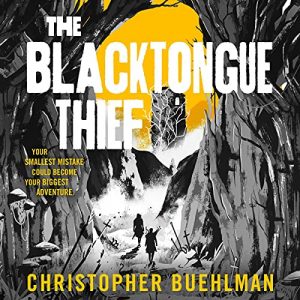 Escape Rating A++: I don’t give A++ ratings often as that’s kind of the point of the thing, but The Daughters’ War absolutely earned one – as did
Escape Rating A++: I don’t give A++ ratings often as that’s kind of the point of the thing, but The Daughters’ War absolutely earned one – as did  A Sorceress Comes to Call by
A Sorceress Comes to Call by 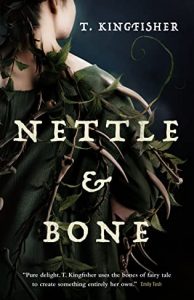 Escape Rating A+: This wasn’t what I expected, although having read quite a bit of the author’s work, I probably should have.
Escape Rating A+: This wasn’t what I expected, although having read quite a bit of the author’s work, I probably should have.  Which is when I felt like I got hit with a clue-by-four, to the point of chagrin that I didn’t figure out a whole bunch of things sooner. Not the way that Hester got the best of the sorceress, but rather the way that the story as a whole worked. And, as I mulled things over more than a bit, the way that
Which is when I felt like I got hit with a clue-by-four, to the point of chagrin that I didn’t figure out a whole bunch of things sooner. Not the way that Hester got the best of the sorceress, but rather the way that the story as a whole worked. And, as I mulled things over more than a bit, the way that  Ivy, Angelica, Bay by
Ivy, Angelica, Bay by 
 On the Fox Roads by
On the Fox Roads by 
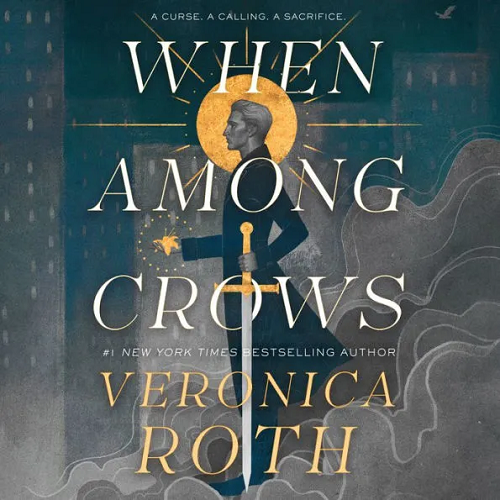 When Among Crows by
When Among Crows by  At the same time, the way this story drew in so many Slavic myths and legends that I itched for a mythopedia (I was driving, that would have had terrible consequences) reminded me, a lot and very fondly, of Neil Gaiman’s
At the same time, the way this story drew in so many Slavic myths and legends that I itched for a mythopedia (I was driving, that would have had terrible consequences) reminded me, a lot and very fondly, of Neil Gaiman’s 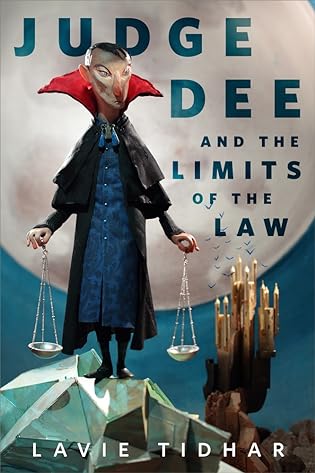 Judge Dee and the Limits of the Law (Judge Dee, #1) by
Judge Dee and the Limits of the Law (Judge Dee, #1) by 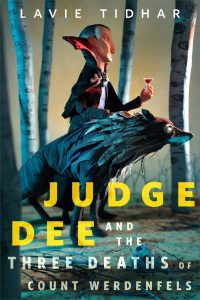 What makes the story fun – more than fun enough that I’ll be picking up the next story the next time I need something short to tide me over an overcommitted calendar – is the first person perspective of poor, put upon, Jonathan. He’s snarky, he’s both world-weary and vampire-weary, but he’s always aware of the side on which his bread is buttered – when he can get any, that is. So his commentary covers the Judge, the law he administers, his opinions and predilections, but also the companionship they provide each other.
What makes the story fun – more than fun enough that I’ll be picking up the next story the next time I need something short to tide me over an overcommitted calendar – is the first person perspective of poor, put upon, Jonathan. He’s snarky, he’s both world-weary and vampire-weary, but he’s always aware of the side on which his bread is buttered – when he can get any, that is. So his commentary covers the Judge, the law he administers, his opinions and predilections, but also the companionship they provide each other. The Bezzle (Martin Hench #2) by
The Bezzle (Martin Hench #2) by  Escape Rating A: The Bezzle is a LOT of things, all of which are fascinating and make for a compelling read, but absolutely none of which are remotely science fiction, whether it is marketed as such or not. And not that SF readers won’t enjoy The Bezzle, because they certainly will and I absolutely did.
Escape Rating A: The Bezzle is a LOT of things, all of which are fascinating and make for a compelling read, but absolutely none of which are remotely science fiction, whether it is marketed as such or not. And not that SF readers won’t enjoy The Bezzle, because they certainly will and I absolutely did.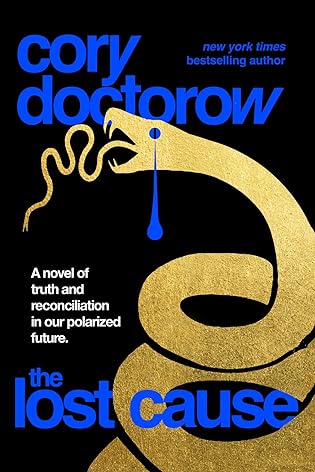 The Lost Cause by
The Lost Cause by 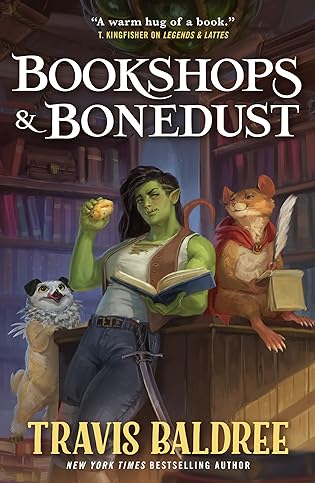 Bookshops & Bonedust (Legends & Lattes, #0) by
Bookshops & Bonedust (Legends & Lattes, #0) by 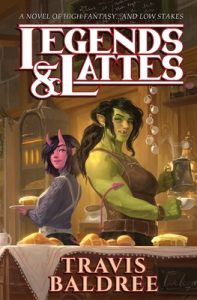 Escape Rating A+: Anyone who sunk straight into the cozy fantasy vibe of
Escape Rating A+: Anyone who sunk straight into the cozy fantasy vibe of